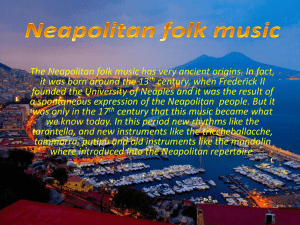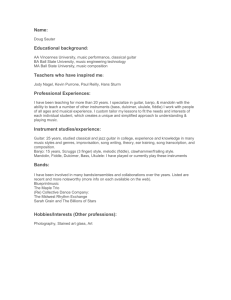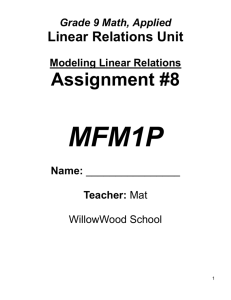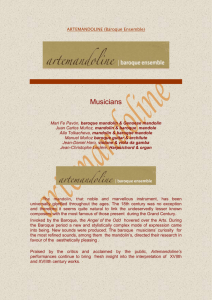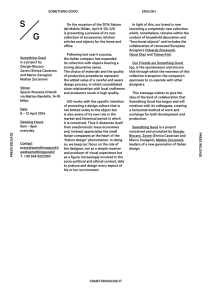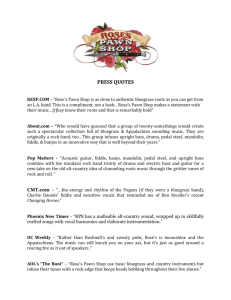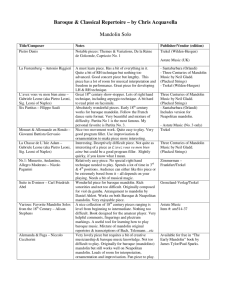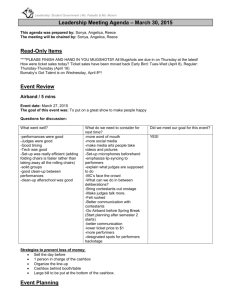“Mando Liscio” with Mattinata di Matteo This 2
advertisement
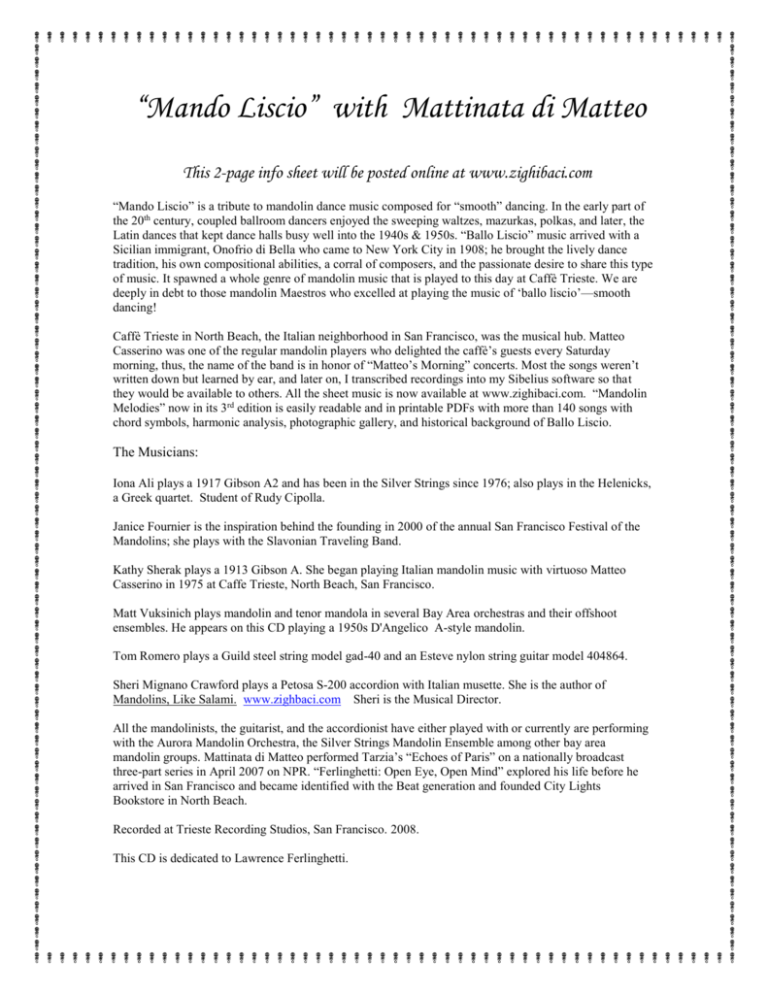
“Mando Liscio” with Mattinata di Matteo This 2-page info sheet will be posted online at www.zighibaci.com “Mando Liscio” is a tribute to mandolin dance music composed for “smooth” dancing. In the early part of the 20th century, coupled ballroom dancers enjoyed the sweeping waltzes, mazurkas, polkas, and later, the Latin dances that kept dance halls busy well into the 1940s & 1950s. “Ballo Liscio” music arrived with a Sicilian immigrant, Onofrio di Bella who came to New York City in 1908; he brought the lively dance tradition, his own compositional abilities, a corral of composers, and the passionate desire to share this type of music. It spawned a whole genre of mandolin music that is played to this day at Caffè Trieste. We are deeply in debt to those mandolin Maestros who excelled at playing the music of ‘ballo liscio’—smooth dancing! Caffè Trieste in North Beach, the Italian neighborhood in San Francisco, was the musical hub. Matteo Casserino was one of the regular mandolin players who delighted the caffè’s guests every Saturday morning, thus, the name of the band is in honor of “Matteo’s Morning” concerts. Most the songs weren’t written down but learned by ear, and later on, I transcribed recordings into my Sibelius software so that they would be available to others. All the sheet music is now available at www.zighibaci.com. “Mandolin Melodies” now in its 3rd edition is easily readable and in printable PDFs with more than 140 songs with chord symbols, harmonic analysis, photographic gallery, and historical background of Ballo Liscio. The Musicians: Iona Ali plays a 1917 Gibson A2 and has been in the Silver Strings since 1976; also plays in the Helenicks, a Greek quartet. Student of Rudy Cipolla. Janice Fournier is the inspiration behind the founding in 2000 of the annual San Francisco Festival of the Mandolins; she plays with the Slavonian Traveling Band. Kathy Sherak plays a 1913 Gibson A. She began playing Italian mandolin music with virtuoso Matteo Casserino in 1975 at Caffe Trieste, North Beach, San Francisco. Matt Vuksinich plays mandolin and tenor mandola in several Bay Area orchestras and their offshoot ensembles. He appears on this CD playing a 1950s D'Angelico A-style mandolin. Tom Romero plays a Guild steel string model gad-40 and an Esteve nylon string guitar model 404864. Sheri Mignano Crawford plays a Petosa S-200 accordion with Italian musette. She is the author of Mandolins, Like Salami. www.zighbaci.com Sheri is the Musical Director. All the mandolinists, the guitarist, and the accordionist have either played with or currently are performing with the Aurora Mandolin Orchestra, the Silver Strings Mandolin Ensemble among other bay area mandolin groups. Mattinata di Matteo performed Tarzia’s “Echoes of Paris” on a nationally broadcast three-part series in April 2007 on NPR. “Ferlinghetti: Open Eye, Open Mind” explored his life before he arrived in San Francisco and became identified with the Beat generation and founded City Lights Bookstore in North Beach. Recorded at Trieste Recording Studios, San Francisco. 2008. This CD is dedicated to Lawrence Ferlinghetti. “Mando Liscio” The CD TRACKS 1. 2. 3. 4. 5. 6. 7. 8. 9. 10. 11. 12. 13. “Giulia” (Julia) is a waltz probably written during the first or second decade of the 20th century. Unknown composer. “Passei Per Espana” (A Walk thru Spain) is a paso doble that Matteo always played. It has a lively ‘bull- ring’ fanfare and fast-moving parts. Unknown composer, probably learned in Sicily since Matteo was born on the southern tip of the island. c. 1910-1920. Speranze Perdute” (Lost Hope) by A. Morelli dates back to 1920s. It is a traditional waltz played at Italian wedding receptions. “El Zopilote Mojado” (The Wet Buzzard). A Mexican polka. Probably written by A. Vicario & M. Fermat. No date. Tony Flores provided the mandolin inspiration upon which the band developed its passionate rendition. “Mio Dolce Sogno” (My Sweet Dream). A waltz written by one of the most famous early 20 th century mandolinist, Giovanni Vicari (AKA Juan Vicari). Gino di Rosa, a manolinist who lives in Rome, provided the lead sheet. “Danza Spagnola” (Spanish Dance) A paso doble. It was composed and arranged for guitar and mandolins by the mandolinist and guitarist Pete Tarzia in the 1950s. Tarzia incorporated a wellknown motif taken directly from the famous guitar piece “Malaguena.” “Il Portovoce” (The Telephone) This lovely waltz was composed for 2 mandolins and guitar by G. Silvestri in 1925. It is part of the Onofrio di Bella collection. Sheri added an accordion part. “Mandolira” (a winged mandolin, a visual reminder of Apollo’s lyre in ancient Greece) dating back to at least the Victorian era when the Calace brothers were experimenting with this form in and around Naples c. 1880s. The World Famous mandolin brothers, Frank and Lawrence Andrini, composed this rumba which has English lyrics. No date, probably the 1940s. The title refers to Lawrence’s childhood mandolira. “Viaggio a Messina” (aka “Una Gita”). The Voyage Crossing to Messina. The mile span between Reggio Calabria and Sicily’s Messina is a ‘short trip.’ Made famous as Odysseus’ treacherous crossing between Scylla and Caribides. Matteo brought this tune to the Trieste from Sicily. Unknown composer. c. 1920. “Lamento Borincano” (aka Lamento Gitano, alternate correct title). A rumba. Composed by Maria Grever, 1930s. Arranged and mistitled as “Lamento Borincano” by Frank and Lawrence Andrini. “Iona Tango” Composed by Matteo Casserino. (named for one of our mandolinists, Iona Ali, who performed with Matteo in the Silver Strings Mandolin Ensemble for many decades). Composed in the middle-late 1970s. “Sunset in Capri” (rumba). This handwritten lead sheet shows both Rudy Cipolla and Pete Tarzia’s name as joint composers. They regularly collaborated and lived near each other in the Sunset District in San Francisco. Possibly composed in the 1960s. “Ziki-Paki, Ziki Pu” A two-step march. (untranslatable title) The song’s Italian lyrics revolve around an Italian soldier/sailor stationed in Pakistan and finds out his girlfriend has given birth to a baby boy who looks just like him. The band took some liberties with the basic melodic line but this version is inspired by Matteo Casserino’s style of playing it. Written by Vittorio Mascheroni, 1929. Sheri Mignano has arranged most of the dances on this debut CD and composed 2nd mandolin parts on all these tracks: #1, #2, #4, #5, #9, #11, #12, #13. The accordion part is improvised and remains unwritten. Thank you for your interest in this music. Sheri Mignano Crawford Zighi Baci Publishing P.O. Box 2704 Petaluma, CA 94953-2704 CONTACT: zighi@sonic.net sfmignano@yahoo.com To learn more about the songs and arrangements on this CD and to order the sheet music (with chord symbols) of all these dances (about 140+), please visit website: www.zighibaci.com
